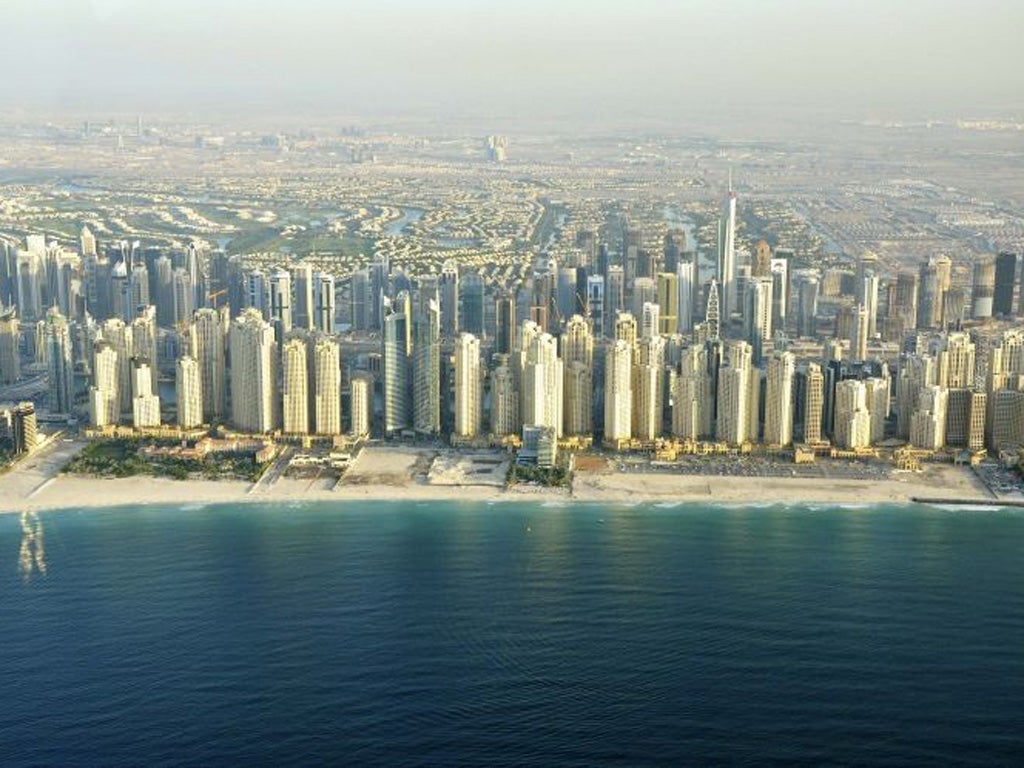High-flyers turn hunger strikers after Dubai desert dream ends in jail
Twenty expats adopt tactics of political radicals to protest at unjust law

Your support helps us to tell the story
From reproductive rights to climate change to Big Tech, The Independent is on the ground when the story is developing. Whether it's investigating the financials of Elon Musk's pro-Trump PAC or producing our latest documentary, 'The A Word', which shines a light on the American women fighting for reproductive rights, we know how important it is to parse out the facts from the messaging.
At such a critical moment in US history, we need reporters on the ground. Your donation allows us to keep sending journalists to speak to both sides of the story.
The Independent is trusted by Americans across the entire political spectrum. And unlike many other quality news outlets, we choose not to lock Americans out of our reporting and analysis with paywalls. We believe quality journalism should be available to everyone, paid for by those who can afford it.
Your support makes all the difference.Hunger striking is a tactic more often associated with prisoners of conscience and political detainees, but a group of expatriates serving prison sentences in Dubai have a background in high finance.
Safi Qurashi, once a millionaire British property magnate, is one of around 20 expats who have gone nearly a month without food in Al Awir Prison in the hope that their protest will bring about a change in laws that criminalise the bouncing of a cheque.
With a sentence of up to three years being handed down for every cheque that bounces, and sentences running consecutively, some are facing decades behind bars.
Qurashi, 43, from London, was among the droves of Western businessmen who flocked to the oil-rich United Arab Emirates to cash in on soaring property prices. Best known for the £43m he invested in buying the Great Britain island on the unfinished World development – an archipelago of artificial islands – Qurashi became entangled in the archaic financial laws when boom turned to bust in late 2008, and is three years into a seven-year sentence for two bounced cheques.
"I have made a vow that the next meal I have will be with my children," he says over the prison phone. "If that doesn't happen then so be it. The hunger strike is either going to take my life or get me out of here." Post-dated security cheques are used to underwrite the majority of financial transactions in Dubai, from mortgages and car loans to property deals. The practice dates back to before the United Arab Emirates was formed in 1971.
But despite lawyers' and officials' recognition of the need for an update to bankruptcy and financial crime laws, changes are yet to be implemented. An Irish expatriate, Christopher Renehan, was the first to begin the hunger strike on 18 April amid frustration that he was unable to settle his financial situation from behind bars. He says late payments from a client caused cheques that he had written to contractors to bounce.
"Not everybody is innocent – I'm no angel myself – but there are a lot of honest businessmen in here who want to pay people but can't," says Renehan, who is serving six years.
Each bounced cheque holds a sentence of up to three years and although the law stipulates they should be issued in "bad faith" for a criminal case, lawyers say this is not how the legislation is interpreted.
Nasser Hashem, partner at a Dubai law firm which takes on around 15 new bounced-cheque cases every month, says the circumstances are not taken into account. "The bouncing of the cheque is considered a crime regardless," he says. "Most of our clients are just people whose circumstances have changed. They've written cheques for a mortgage or car payments and then lost their job."
Unlike neighbouring Abu Dhabi, where the same law applies, in Dubai sentences for cheques related to the same case run consecutively, rather than concurrently, leaving former businessmen with hefty sentences.
Facing one of the longest is Peter Margetts, 48, a property developer from Kew. Margetts was cleared of fraud charges, but given 23 years behind bars for bounced cheques. His 46-year sentence was halved on appeal.
"There's no defence to a bad cheque – if it bounces you go to jail," he says. "I've exhausted all legal avenues and I've lost hope. I'm here for longer than some people get for murder, rape and really heinous crimes."
Prison officials have repeatedly denied that any of the men are on hunger strike, despite the fact that one Belgian inmate, Olivier Loeb, who had begun to refuse liquids, collapsed in a court hearing on Thursday morning and was admitted to hospital.
As growth and consumer confidence return to the UAE, outdated business practices remain a concern to foreign investors. Officials have complained that cheque cases clog the judicial system and the outspoken chief of Dubai Police, Dhahi Khalfan Tamim, is among those to call for bounced cheques to be considered as a civil offence.
"Everybody knows there is a problem with the law," says Loeb. "They just need to solve it."
By numbers
240,000 Britons living in Dubai
0 Dubai’s income tax rate
265 Britons arrested in Dubai in 2010
Join our commenting forum
Join thought-provoking conversations, follow other Independent readers and see their replies
Comments